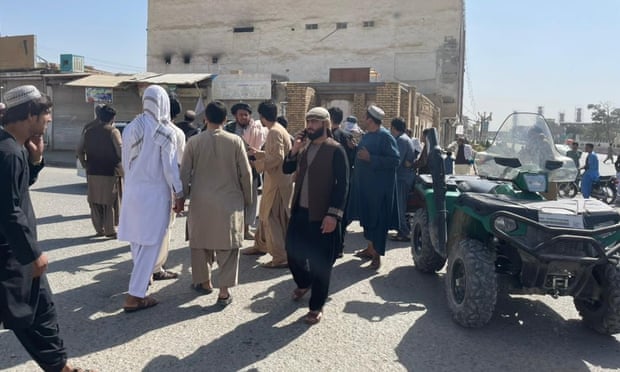By Abdul Rauf Wafa in Kandahar and Emma Graham-Harrison

PPeople gather at the scene of the blast in Kandahar. Photograph: Anadolu Agency/Getty Images
A suicide bombing at a mosque in the southern Afghan city of Kandahar has killed at least 47 people and injured more than 80, in the second major attack on Shia worshippers in Afghanistan in a week.
The Imam Bargah mosque was particularly crowded when the attackers struck, because the community had been holding memorial prayers for the victims of the previous bombing, in northern Kunduz province.
Friday’s attack, like the previous bombing, was claimed by the Islamic State’s local affiliate, Islamic State Khorasan Province (ISKP), which has a long history of attacking Afghanistan’s Shia minority.
Four men arrived around 1.00pm local time (0930 BST) detonating at least one bomb at the mosque gate and two more among two more among worshippers inside, witnesses said.
“It was prayer time when the sound of three to four shots was heard and right after that an explosion happened in the mosque,” said Basir Ahmadi, who was waiting outside Kandahar’s main hospital for news about injured relatives.
The blasts left blood smeared across the green prayer hall, where dazed and injured survivors sat waiting for help among the bodies of those who died. Glass in the doors and windows was blown out.
Kandahar is the Taliban’s heartland, and this is the first time in recent years that its minority Shia residents have been directly targeted in a terror attack there.
The bombing came a week after a similar suicide attack at a mosque in northern Kunduz province killed at least 46 people. That attack was claimed by a local branch of Islamic State. “We [Shia] are finished, we are so misfortunate,” said Ali Reza, weeping outside Mirwais hospital after learning that his cousin had died.
The killings, and other IS bombings – including an attack on a gathering of senior Taliban in Kabul – are undermining the Taliban’s claim they have brought security to Afghanistan after decades of war.
Their leaders have presented the chance of peace as a key benefit of their rule, as Afghans pay a high economic price for the abrupt national takeover by a group whose commanders are on UN terror sanctions lists.
They are yet to win recognition of their government from any other country and the national economy is collapsing after the abrupt end to international support, hitting services from the army and police to healthcare and education.
“People were only happy about the Taliban because they thought there would be security. However, now there is neither security nor employment opportunities for people,” said one social activist who asked not to be named.
“Life is becoming difficult and risky in Afghanistan for every Afghan, especially for Shias as Isis are only targeting Shia Muslims in Afghanistan. The world communities must help Afghanistan and Afghans in this terrible time.”
Since the Taliban took control, IS has claimed a string of attacks across the north and the east, where they are largely based at present. This bombing, in the Taliban’s southern stronghold, represents an even stronger challenge to the new government.
Because of a rise in attacks on Shias across Afghanistan in recent years, the Imam Bargah mosque had armed guards until two months ago, Ahmadi said. It is the largest serving the city’s Shia community and draws hundreds of worshippers to prayers, making it an obvious potential target.
The militants’ promise that they had brought security to a city particularly badly affected by the last two decades of conflict, and their desire to tighten control over a country awash with weapons after years of war, may have left the mosque exposed.
“Before the Taliban took over, there were some Shia guards outside the mosque. However, the Taliban collected all guns from these security guards and now there are no people to guard this big mosque although there is obvious risk to Shia people in Afghanistan,” he said.
At the Mirwais regional hospital, a surgeon, Mohammad Rafiq, said 32 dead had been brought to the hospital, but other bodies had been taken home directly from the mosque. There were also at least 80 injured, and his staff were overwhelmed with victims and short of blood for transfusions.
“The hospital does not have the capacity to treat more casualties now and therefore the ones who are not severely injured are referred to private hospitals in the city,” he said. A call for blood donations brought an overwhelming response, with dozens of men, both Sunni and Shia, lining up outside the hospital to donate.
The Taliban government offered condolences to the victims’ families and promised to bring the perpetrators to justice, said a statement from its spokesperson, Zabiullah Mujahid.
The majority of sectarian attacks on Shia civilians in recent years have been attributed to the regional Islamic State affiliate.
The group, under its extreme interpretation of Islam, does not consider Shia to be Muslims, and has targeted them for killings wherever it operates.
The Taliban have not claimed any sectarian attacks in recent years, although they persecuted the Hazara minority who make up most of the country’s Shia, when they ruled Afghanistan in the 1990s.



